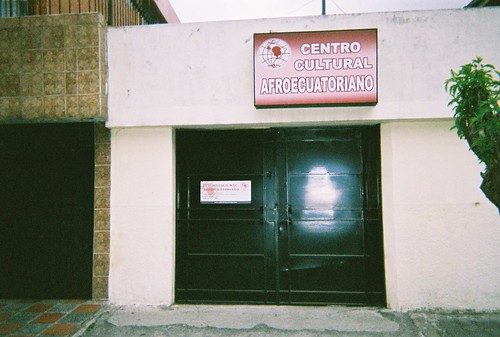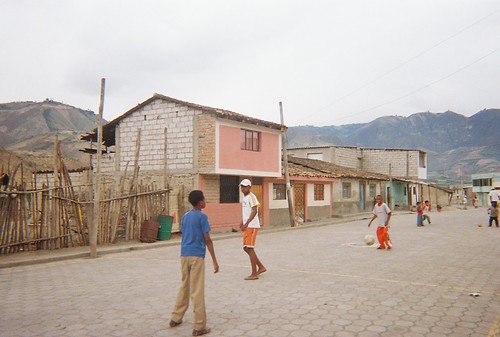
In the combative spirit of María Chiquinquirá, we advance together in the struggle for our rights. --Luzmila Bolaños
Today, the first Sunday in October, Black Ecuadorians honor their ancestors by celebrating the National Day of Afro-Ecuadorian People. The festivities include athletic competitions, concerts and an Afrocentric religious services. This day was established by Ecuador's National Congress for the purpose of improving human rights conditions of Afro-Ecuadorians. Various civil rights organizations, such as Corporación de Desarrollo Afroecuatoriano (Corporation of Afroecuatoriano Development) sprung up to preserve Afro-Ecuadorian culture and to pursue equal rights as members of Ecuadorian society.
Afro-Ecuadorians in Valle de Chota (Chota Valley) of the Andes Mountains are descendants of emancipated slaves, unlike those in the western Province of Esmeraldas.
When 23 African men and women aboard a wrecked Spanish slave ship headed for Perú liberated themselves and created a free Black community, in October 1553, they set a standard of resistance and empowerment that would in spire their descendants hundreds of years later. Traditionally, as a country colonized by Spain, blacks were victims of racist conduct, social insults, and considered inferior. Today, employers advertise for job applicants with a "good appearance," a code-word for White or European characteristics. Landlords openly reject applications from Blacks looking for housing in middle-class areas. It wasn't until 1998 until Ecuador's constitution acknowledged Afro-Ecuadorians as a distinct group.

Most of Ecuador's blacks, descendants of runaways from an abandoned slave ship bound for Perú, live in the province of Esmeraldas on Ecuador's Pacific Coast.
Yet, Afro-Ecuadorians have many examples of the rich cultural heritage of black people that has been shown in all scopes of society, such as politics, sports, literature, music, etc. Their ancestors arrived from Africa and its contribution in music with traditional instruments like the marimba; colorful attires, their prolific dancers, their history, traditions, and their own customs. Government statistics say that the black population in the country constitutes on three percent, but in reality, more like nine percent. In Ecuador, there are black communities in provinces of Imbabura, Carchi, Loja, and Esmeraldas. Social activists say the stereotypes and lack of opportunity are slowly changing as the numbers of Afro-Ecuadorians finishing high school and going on to college have increased over the past decade.

Hello Bill: Thank you for this fascinating information. I'd like to teach an African American Studies class at the Community College where I'm currently teaching a Child Psychology class. Whenever i manifest doing so- Id like to invite you to come speak. In fact- if you're open I could tell current Black Studies instructors of the College of Alameda.
ReplyDeleteSincerely,
Ramona (from church & FB)
Great story, there are some notable stories of U.S. slaves who used or attempted to use the law to become free. However, I never heard of anyone in South America doing this until now. This is the case, because there is much more accessible information on slavery in the U.S. than any other country or colony.
ReplyDeleteAlso that picture is actually a sketch of an Afro Brazilian slave from the book, "Voyage Pittoresque dans le Bresil":
http://hitchcock.itc.virginia.edu/Slavery/detailsKeyword.php?keyword=brazil&recordCount=179&theRecord=134
//Very rare book.
i read a commentary critiquing the history that you hear time and time of afro-descendants being the descendants of escaped slaves. The author said that many where brought just like the rest of us- slaves on a slave ships, but there is a denial in that history. Denying the pain and stigma of slavery so they pass this romantic view of escape around because they have a greater sense of pride
ReplyDeletePalenques and Maroon colonies (escape slave settlements) are historical facts throughout the Caribbean and Latin-America. If you find the source of such arguments deny it, please post with the name of the author. I'd like to look into it.
ReplyDelete